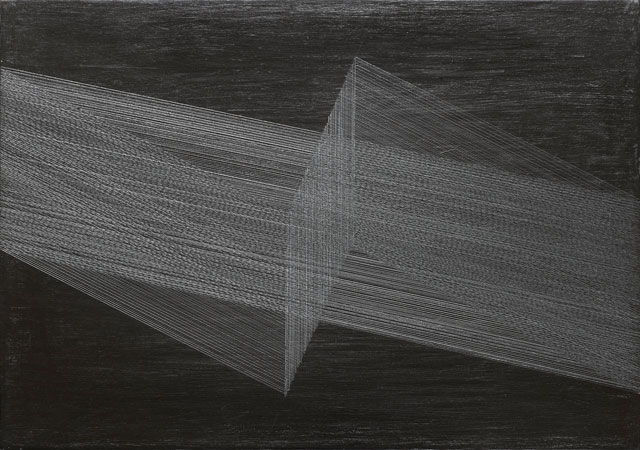Mary Griffiths (b1965, the Wirral) has long been making drawings of (frequently derelict) industrial sites. A year and a half ago, she was introduced to Astley Green Colliery, a former coalmine in Lancashire, which was closed in 1970 and knocked down but for its winding house and headgear – rare examples of 1908 working-class engineering. Spending time at the site, walking around the surrounding geography, reclaimed by nature with trees, grass and mosses, and talking to the volunteers (the colliery is now a museum), Griffiths filled myriad A6 sketchpads with figurative drawings, focusing on aspects that intrigued her, from details of the machinery to a visiting colony of pigeons.

Mary Griffiths, Circuit Gate, 2018. Inscribed graphite on gesso on plywood, 21 x 1.8 x 29.7. Photo courtesy Alan Cristea Gallery.
From these drawings, she then extrapolated her larger abstract works, made on plywood, with layers of acrylic gesso, and even more layers of graphite, pushed into the board and burnished, before being cut into with an etching needle. Using thousands of straight lines, placed at minutely different angles, she creates an oscillating effect reminiscent of the surface geography of the region. One work, Wild Honey, for example, represents the seams of the coalmine, the waterways and the main roads. Griffiths sees her work as “an identification of the remarkable work that was done in industrial areas” across the country, and it is important to her to capture something of the “gravity and splendour” of the working-class engineering.
.jpg)
Mary Griffiths, Sweet Briar (Yates & Thom Ltd), 2018. Inscribed graphite on gesso on plywood, 49 x 2.5 x 69 cm. Photo courtesy Alan Cristea Gallery.
Protest and Remembrance
Miriam de Búrca | Joy Gerrard | Mary Griffiths | Barbara Walker
Alan Cristea Gallery, London
28 February – 30 March 2019
Interview by ANNA McNAY
Filmed by MARTIN KENNEDY
Takesada Matsutani: Shifting Boundaries, and Tetsumi Kudo: Microcosmos
A pair of exhibitions by two Japanese innovators show contrasting approaches to the plastic revoluti...
Cosmos: The Art of Observing Space
Hard science meets soaring imaginations in a show brimming with cosmologically inspired artworks...
Paper Tiger Television: It’s 8:30. Do you know where your brains are?
A poignant exhibition takes us to a lost age of anti-corporate, earnestly intellectual media – wit...
This exhibition spans 50 years, from the now 90-year-old photographer Don McCullin’s gruelling 196...
Bringing together the best of two brilliant collections, this exhibition celebrates modern British p...
Hito Steyerl: Humanity Had the Bullet Go in Through One Ear and Out Throug...
The much-garlanded German artist-essayist Hito Steyerl turns her penetrating gaze to AI, automata an...
Laura Lima’s installation The Drawing Drawing at the ICA is delightfully disorienting, with the mo...
Christina Mackie: Material Reality
Through a series of installations, which can be read and reread on multiple levels, Christina Mackie...
Bringing together artists from the 19th century to the present, this engaging exhibition kicks off t...
Taking its title from an Oscar Wilde short story, this group show whose setting echoes the salons an...
Something Else Entirely: The Illustration Art of Edward Gorey
As the Society of Illustrators celebrates the centenary of Edward Gorey’s birth, we look back at t...
London Mithraeum is the perfect space for Manders’ three new yet timeless works. Before the openin...
At the opening of his first public exhibition, Nat Faulkner, winner of the Camden Art Centre Emergin...
Richard Hawkins: Potentialities
Bringing together early religious imagery, ritual performance, painting and AI, Hawkins taps into th...
Reflections. Picasso x Barceló
Ceramics by Picasso are juxtaposed with works by Miquel Barcelo, one of Spain’s leading contempora...
Award winners Roman Manfredi and Sayuri Ichida bring lost and overlooked communities into view, with...
Dom Sylvester Houédard: dsh* and EE Vonna-Michell – Henri Chopin: To Ra...
This exhibition draws together the concrete typestracts of Houédard with a stunning film by Henri C...
Organised in conjunction with the Abu Dhabi Music & Arts Foundation, this extensive exhibition at Se...
What characterises a monument? Mass? Authority? Glory? And what should be its destiny? If inspiring,...
Including works by Bert Hardy and Oscar Marzaroli to Alan Dimmick and Iseult Timmermans, this exhibi...
Kira Freije: Unspeak the Chorus
Kira Freije has created 26 new works for this show, life-size figures imbued with a rich and often ...
The Frick Collection: The Historic Interiors of One East Seventieth Street...
Celebrating the newly renovated Frick Museum, this treasure of a book takes the reader on a room-by-...
The artist explains feeling that she belonged neither to the Vietnamese community of her heritage or...
A thought-provoking exhibition of archival material and related artworks celebrating the centenary o...
From river pollution to radioactive waste, through aquatic atmospheres and mythic journeys, Emilija ...
This magnificent exhibition includes bold posters, woodcuts, portraits and still lifes, but it is Wi...
Through painting, sculpture and film, three international artists ask us to reflect on ecological de...
Dana Awartani: Standing by the Ruins
Using traditional craft techniques, Dana Awartani traces the destruction of cultural heritage sites ...
The loss of an icon is ever of great note but that the iconoclast architect Frank Gehry’s passing ...
Luigi Ghirri: Polaroid ’79-’83
Luigi Ghirri’s spell using Polaroid cameras takes us on an imaginary adventure, with leading clues...